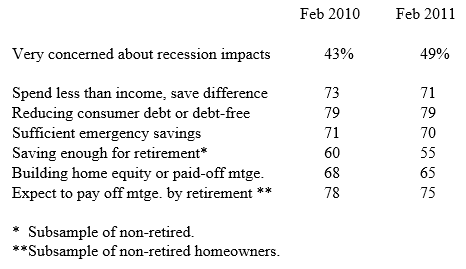Washington, D.C. – The fourth annual national survey assessing household saving revealed that, despite hopeful macroeconomic signs, more Americans are concerned about recession impacts on their personal finances than a year ago. Moreover, they report slippage on key saving indicators.
The survey was released during America Saves Week, in which hundreds of national and local organizations are making a special effort to encourage and promote saving by individuals and families. America Saves and the American Savings Education Council (ASEC) coordinate this effort. These two organizations commissioned a survey, undertaken by Opinion Research Corp. in early February, of a representative sample of more than 1,000 adult Americans.
As the figures below indicate, the proportion of respondents who are “very concerned” about the impact of the current recession on their personal finances rose from 43 percent in February 2010 to 49 percent this year. (In 2009, this figure was 53 percent.) Moreover, the proportions of those spending less than they earn and saving the difference, those reducing consumer debt or debt-free, those having sufficient emergency savings, those saving enough for retirement, those building home equity or having paid off their mortgage, and those expecting to pay off one’s mortgage before retirement either declined or remained the same over the past year.

“The recession clearly has not ended for millions of Americans,” noted Stephen Brobeck, Consumer Federation of America’s Executive Director and a founder of America Saves. “The persistence of high unemployment rates, large consumer and mortgage debts, and the housing crisis may help explain the lack of saver progress,” he added.
“This survey, and our other retirement surveys, suggest that most American families continue to face stiff savings challenges,” said Dallas Salisbury, CEO and President of the Employee Benefit Research Institute.
However, there are indications that many Americans are trying to meet these challenges. Over the past year, the proportion of those with a saving plan rose from 55 to 57 percent, those saving for retirement at work rose from 49 to 54 percent, and those saving automatically outside work rose from 41 to 44 percent. “Many Americans are making an effort to manage their finances more effectively even if they have yet to see much progress,” added Salisbury.
Consumers with Savings Plans Far More Likely to Save, Reduce Debt
There are striking differences between the savings progress of those with and without a savings plan, as the figures below suggest.

These differences, to a large extent, reflect income differences, as the figures below suggest. But not entirely, noted Brobeck: “Almost anyone can develop and implement a savings plan, even if this plan is difficult to implement and results in modest savings of only loose change or $25 monthly transfers from checking to savings.”

“Developing a savings plan is key to reaching your savings goals,” said Ken McDonnell, Director, American Savings Education Council. “Other research by EBRI has shown that individuals who have conducted a retirement needs calculation, for example, are more confident in their ability to reach that goal.”
Wide Range of Groups Agree: Let’s Help Americans Save More
Now in its fifth year, America Saves Week has grown to encompass more than 1,800 organizations. Financial institutions, consumer groups, government agencies, local campaigns, employers, educators, non-profits, and the military have reached a consensus that Americans need to increase their savings habits to ensure their own – and the nation’s – financial health. “The combined efforts of all these partners is empowering people to start saving, to save regularly, and to make savings automatic,” said Nancy Register, Director of America Saves. “Many people find that once they set up an automatic savings plan that puts a small portion of their income directly into a separate account, they never miss it, and the savings helps them build the future they want.”
ING U.S. Retirement Services is rolling out a campaign that encourages workers to take the 2% reduction in Social Security taxes for 2011 and give it to themselves as a “Retirement Raise.” “For most Americans, workplace plans represent the cornerstone of their retirement assets,” said Catherine Smith, CEO of ING U.S. Retirement Services. “Maximizing the power of your workplace plan is something everyone should consider.”
Washington State is one of the leading states in financial education and asset building, where Governor Chris Gregoire has issued a proclamation for the fourth year in a row declaring Feb. 20-27th “Washington Saves Week.” State Treasurer James L. McIntire pointed out, “You don’t have to make a lot of money to have the ability to save. When they sit down and do their budgets, families can, in effect, pay themselves first.”
The U.S. Department of Agriculture’s Cooperative Extension system provides financial education and motivational workshops across the country. This year it is providing programs in 30 states that are expected to attract more than 200,000 participants. “We are using financial fairs, mall events, social networking, Piggy Bank Pageants, and websites to motivate Americans to take action toward a more financially secure future,” said Susan S. Shockey of the USDA’s National Institute of Food and Agriculture.
52 local campaigns across the country reach thousands of Americans at the grassroots level. Utah Saves Campaign Coordinator Ann House has worked with the state legislature and Governor Gary Herbert to pass a resolution declaring the last week of February as “Utah Saves Challenge Week.” “I wanted to get Utahns moving, to actually doing something about becoming financially secure,” said House. “Each day of the Week, there will be a financial challenge, such as ordering a free credit report, tracking every expense for one day, and holding a financial conversation with one’s family.”
As the country digs out of the Great Recession, many Americans want help to reduce debt and build up savings. America Saves Week seeks to make that a national conversation, and to turn it into action.

